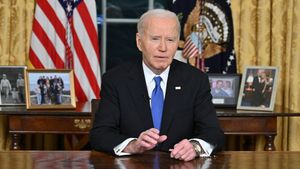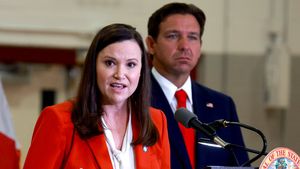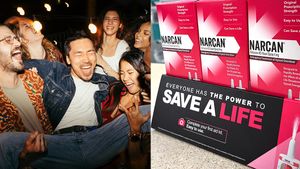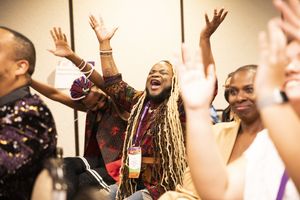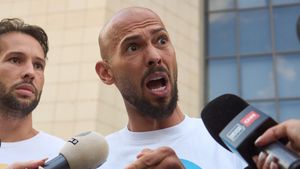
Treatment GuideJust DiagnosedSex & DatingAfrican AmericanStigmaAsk the HIV DocPrEP En EspañolNewsVoicesPrint IssueVideoOut 100
CONTACTCAREER OPPORTUNITIESADVERTISE WITH USPRIVACY POLICYPRIVACY PREFERENCESTERMS OF USELEGAL NOTICE
© 2025 Pride Publishing Inc.
All Rights reserved
All Rights reserved
By continuing to use our site, you agree to our Private Policy and Terms of Use.
Gil Robertson has been talking about HIV for more than two decades. In the early 1980s the virus hit his family when older brother Jeffrey was diagnosed with what was then known as HTLV-III. 'Both of my parents took very seriously the meaning of that word family,' he says of their reaction to the news that Jeffrey Robertson probably didn't have long to live. 'They set forth a position that we were going to stand by him through this journey and that we were going to circle the wagons, so to speak.' Robertson says, though, that he was troubled to discover that his support for his brother'both in terms of his being gay and his ongoing battle with HIV'tends to be atypical among African-Americans. 'I just didn't see a lot of African-Americans taking part in that dialogue,' he says of his peers' attention to the growing AIDS epidemic. The writing on the wall is there to read. Black Americans are infected in vastly disproportionate numbers, representing nearly half of all new HIV cases diagnosed each year despite being roughly only l3% of the overall U.S. population. They are also, to the detriment of their ongoing health, less likely to be aware of their infection. And partly because they are often diagnosed only at the point when their immune systems are already depleted, their survival time after diagnosis is lower on average than that seen in white or Latino HIVers. In 2003, 55% of all deaths from AIDS-related complications were among African-Americans. In light of these troubling facts, Robertson decided to start his own very public conversation. An arts-and-entertainment journalist who writes the syndicated column the Robertson Treatment, he assembled a choir of black voices, both prominent and unknown, to tell stories about how AIDS affects their lives. The resulting book of essays, edited by Robertson and titled Not in My Family: AIDS in the African-American Community, was published on World AIDS Day. It was honored this year with an Image Award nomination for best nonfiction by the National Association for the Advancement of Colored People. Diverging Opinions The voices in the choir of Robertson's book don't necessarily sing in harmony, particularly over whether to moralize about sexuality in general and promiscuity in particular. In his essay, civil rights activist Al Sharpton voices concern over efforts to push the message of sexual abstinence. Meanwhile, Pernessa C. Seele, founder of the Balm in Gilead, a not-for-profit organization that advocates for the health of African-Americans through faith-based initiatives, argues that abstinence lessons must begin when children are 5 to 7 years old, 'before we lose one more child to the destructive culture of sex and violence in which we live.' Seele goes on to write, 'Every theological position on homosexuality should and must be respected.' Los Angeles'based media consultant Christopher Cathcart argues, though, that homophobia among African-Americans is crippling their ability to embrace the fight against HIV. Famed adult-film actor Mr. Marcus provides an unapologetic description of the means by which he supports his wife and children. But Dr. James Benton, a radiation oncologist in Atlanta, writes, 'Sexual promiscuity must be rejected and individuals who engage in this activity must be reminded that this act is not only morally wrong but can be deadly wrong.' Robertson isn't too worried that all this dissent will hamper progress. '[The African-American community] is just like any other community,' he says. 'It's not a monolith, and people have various opinions based on their beliefs and their values, their experiences. I think it's been proved historically that African-Americans are extremely compassionate people, and while we may disagree, it's certainly not because of a lack of compassion or a lack of sacrifice.' 'I don't expect a kumbaya moment,' says Cathcart. 'I actually don't mind when we get together and scream at each other.' 'Hopefully this is the beginning of the black community really just coming to terms and dealing with HIV,' Robertson says. Gregorio Millett, a behavioral scientist at the Centers for Disease Control and Prevention who studies the impact of the AIDS epidemic among African-Americans, says dialogue about the disease is extremely important as a means of normalizing the issue. 'The stigma of having HIV is still fairly great in our society and definitely in the black community,' he says. 'And the only way that we're going to be able to overcome that stigma and even stem the infections within the community'as well as to get people to take care of themselves'is if we make it a safe enough space for people to come out about their diagnoses.' Up Against the Stats 'There is a killer in our midst,' says Phill Wilson, chief executive officer of the Los Angeles'based Black AIDS Institute and one of the book's essayists. 'And where does it attack us? It attacks us in our families.' Evidence shows that African-Americans are increasingly aware of this fact. In a March 2006 Kaiser Family Foundation survey of American attitudes, 63% of black respondents reported knowing someone who has HIV or who has died of AIDS. And 39% said they see HIV as the most urgent health concern facing the nation, compared to 13% of white respondents. About half of the African-Americans surveyed considered AIDS a 'more urgent' concern in their communities than the disease was a few years ago. However, the same survey showed that the proportion of African-Americans who reported being 'very concerned' about becoming infected with HIV has dropped steadily over the years'from 55% in 1995 to 34% in 2006. And only a third considered black people more likely than whites to be infected with HIV. (According to the CDC, the African-American population actually has an AIDS case rate 10 times that of white Americans.) Further complicating the picture is a 2005 study from Oregon State University and the RAND Corp. showing that a significant core of African-Americans subscribe to conspiracy theories about AIDS and that those who do are less likely to use condoms to prevent transmission. About one in four surveyed believed that 'AIDS was produced in a government laboratory,' and nearly one in six thought the disease was created by the government to control the black population. Waking Up to the Crisis? Jeffrey Robertson, Gil's brother, says he has been trying to wake up other black Americans to the HIV crisis for years'but with only discouraging results. He takes a moment to recall an effort he made to arrange a workshop about HIV at his church. Only three people showed up. Jeffrey says he was proud of and touched by his brother's efforts to create the book Not in My Family but that the sudden evidence of a groundswell of support for his very personal cause left a bittersweet taste in his mouth. 'What made me sad was the fact that it has taken this long for someone to even take the time to get this project together,' Jeffrey says. 'My concern is, will it touch the right people?' The Black AIDS Institute's Wilson says signs of change are visible. He sees the leadership of the NAACP getting behind HIV awareness campaigns. He sees the 25 black leaders who attended the August 2006 International AIDS Conference in Toronto to issue a call to action. He recognizes the leadership of prominent African-Americans'faith leaders such as Bishop T.D. Jakes and Bishop Charles Blake; U.S. Congress members Maxine Waters, Barbara Lee, and Charles Rangel; celebrities Danny Glover and Ludacris; and the black media, including Ebony, Jet, and Essence. According to Wilson, all of them are making HIV a top priority. So is Gil Robertson. 'I'm really committed,' he says, 'to continuing this discussion within the community and really just not letting go of it until we as a country, we as a people, we as a nation start to address this disease the same way we would any other.'
From our Sponsors
Most Popular
Why activist Raif Derrazi thinks his HIV diagnosis is a gift
September 17 2024 12:00 PM
How fitness coach Tyriek Taylor reclaims his power from HIV with self-commitment
September 19 2024 12:00 PM
Out100 Honoree Tony Valenzuela thanks queer and trans communities for support in his HIV journey
September 18 2024 12:00 PM
Creator and host Karl Schmid fights HIV stigma with knowledge
September 12 2024 12:03 PM
The freedom of disclosure: David Anzuelo's journey through HIV, art, and advocacy
August 02 2024 12:21 PM
From ‘The Real World’ to real life: How Danny Roberts thrives with HIV
July 31 2024 5:23 PM
Eureka is taking a break from competing on 'Drag Race' following 'CVTW' elimination
August 20 2024 12:21 PM
California confirms first case of even more deadly mpox strain
November 18 2024 3:02 PM
Plus: Featured Video
Latest Stories
A camp for HIV-positive kids is for sale. Here's why its founder is celebrating
January 02 2025 12:21 PM
This long-term HIV survivor says testosterone therapy helped save his life.
December 16 2024 8:00 PM
'RuPaul's Drag Race' star Trinity K Bonet quietly comes out trans
December 15 2024 6:27 PM
Ricky Martin delivers showstopping performance for 2024 World AIDS Day
December 05 2024 12:08 PM
AIDS Memorial Quilt displayed at White House for the first time
December 02 2024 1:21 PM
Decades of progress, uniting to fight HIV/AIDS
December 01 2024 12:30 PM
Hollywood must do better on HIV representation
December 01 2024 9:00 AM
Climate change is disrupting access to HIV treatment
November 25 2024 11:05 AM
Post-election blues? Some advice from mental health experts
November 08 2024 12:36 PM
Check out our 2024 year-end issue!
October 28 2024 2:08 PM
Meet our Health Hero of the Year, Armonté Butler
October 21 2024 12:53 PM
AIDS/LifeCycle is ending after more than 30 years
October 17 2024 12:40 PM
Twice-yearly injectable lenacapavir, an HIV-prevention drug, reduces risk by 96%
October 15 2024 5:03 PM
Kentucky bans conversion therapy for youth as Gov. Andy Beshear signs 'monumental' order
September 18 2024 11:13 AM
Study finds use of puberty blockers safe and reversible, countering anti-trans accusations
September 11 2024 1:11 PM
Latinx health tips / Consejos de salud para latinos (in English & en espanol)
September 10 2024 4:29 PM
The Trevor Project receives $5M grant to support LGBTQ+ youth mental health in rural Midwest (exclusive)
September 03 2024 9:30 AM
Introducing 'Health PLUS Wellness': The Latinx Issue!
August 30 2024 3:06 PM
La ciencia detrás de U=U ha estado liberando a las personas con VIH durante años
August 23 2024 2:48 PM





































